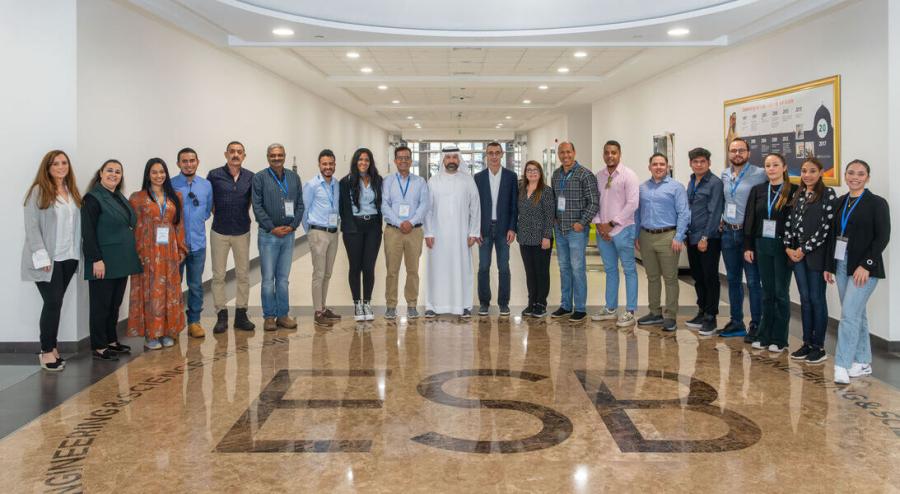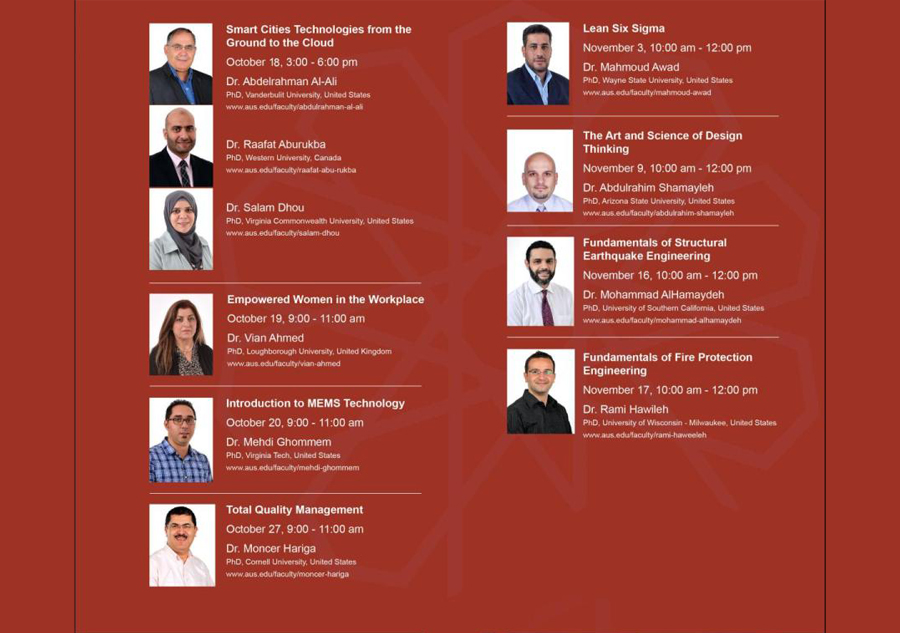The College of Engineering (CEN) at American University of Sharjah (AUS) has everything you need to sharpen your competitive edge. Our experts have the experience and expertise to boost your position in the marketplace. From our many professional training programs, to our faculty’s internationally recognized research projects, we have a proven track record of applying our specialized technical knowledge to create solutions for industry partners. Whether you are a multinational corporation looking to revamp your supply chain management or technical skills, or a start-up seeking to develop new technology, we have the knowledge and resources to push your company to the forefront of the marketplace. Our executive education courses can be delivered within AUS’ state-of-the-art facilities, within an organization’s premises or online and can be offered to organizations or individuals.
Offered Programs
CEN Executive Education recognizes that no two organizations are the same when it comes to skills development—every organization has its own unique challenges and opportunities. By working with CEN Executive Education team at AUS, you can customize a professional program that is right for your organization and the talent within it. Our experts can design training programs across all levels in your organization, from your newest engineers and computer scientists and recruits identified as talent to your experienced managers.
These programs are thoughtfully designed to empower individuals like you to unleash your maximum potential. They offer valuable insights and state-of-the-art tools tailored to address your specific development needs.
At the heart of the college is an exceptional body of faculty members who are committed to the development of professional engineers and computer scientists. Our curriculum combines challenging classroom study and rich hands-on laboratory experience, along with a focus on design, teamwork and communication skills, preparing our graduates to meet 21st century technological challenges and improve the well-being of society.
Click here to download our brochure.
Contact us today at [email protected] to find out more.
Upcoming Programs
- Certificate Training Program in 3D Printing
Overview:
Introduction to 3D printing technology and digital construction, mix design for 3D applications, mechanics and structural design considerations, automation, site production, impact on transportation network and project management challenges.
Program Outcomes:
This course is designed to help the student:
- gain knowledge about 3D printing technology and digital construction
- understand the design of concrete mixture for 3D applications
- evaluate the properties of fresh and hardened concrete
- build a thorough understanding of the relations between loads applied and the stresses produced in 3D printing application
- understand structural design requirements for 3D printing applications
- gain knowledge about mechatronics
- determine challenges and future needs in management, transportation and site
Delivery Methodology:
Methods include lectures, problems solving, computer lab sessions, materials lab sessions and project-based learning. The course consists of six modules. Each module has a specific outcome and assessment tools. All modules are designed to provide knowledge about the 3D printing technology in construction and related activities.
Who Should Attend: Engineers
- Artificial Intelligence and Data Science
Program Objectives: The main objective of this certificate program is to train selected personnel on:
- Python programming
- machine learning; supervised learning, un-supervised learning, time series forecasting, Python libraries for machine learning, etc.
- marketing and retail analytics, web and social media analytics, finance and risk analytics
- software tools for data visualization
Program Description:
- Module 1: Python Foundations and Statistics
- Module 2: Basics of Machine Learning (ML) and Python Libraries for ML
- Module 3: Machine Learning Techniques and Insights
- Module 4: Analytics and Visualization
Program Outcomes:
- Learn and appreciate the importance of machine learning in today's world
- Apply Python programming concepts
- Design machine learning models to solve various problems, e.g., time-series forecasting
- Understand marketing and retail analytics, web and social media analytics, finance and risk analytics
- Apply data visualization and its principles using software tools such as Power BI
- Work in teams
Who Should Attend: Personnel, with an undergraduate/graduate degree with basic understanding of programming
Delivery Methodology: The program will be delivered in person in lecture rooms and/or computer labs at the AUS College of Engineering.
- Certificate of Fire Safety Engineering
Introduction and Program Objectives:
Recent large fires in residential and industrial complexes across the UAE and the region have triggered a need for education about fire safety in building design, construction and maintenance, especially in high-rise buildings and industrial facilities. The aim of this certificate program is to enhance the knowledge of engineers, architects, building consultants and regulatory officials in fire safety and hazard assessment. Upon completion of the program, participants will be able to:
- apply the latest advances in the field of active and passive fire protection systems and risk assessment for enhanced fire safety
- describe fire behavior and fire resistance evaluation through testing and calculation methods
- apply theoretical and practical aspects of engineering fire safety in buildings, built infrastructures and industrial facilities
- describe the fundamentals of fire dynamics from ignition to flame spread
- describe chemical fires and explosions
- manage process risk and control of process hazards
Prerequisites:
- Bachelor of Science in Engineering (chemical, civil, electrical, electromechanical, mechanical, industrial, or any other related field).
- Bachelor of Science in Architecture, Architectural Engineering, or any other related field.
Who Should Attend:
- Practicing design engineers and architects: government and private
- Fire engineering contractors
- Government (local/state) regulatory and building officials
- Scientists and officers from government
- R&D organizations and ministries
Structure of the Fire Safety Engineering Certificate Program:
This certificate program is composed of four modules:
• Module 1: Fundamentals of Fire Protection Engineering
• Module 2: Fire Detection and Protection Systems
• Module 3: Performance and Behavior of Structures and Occupancy in Fire
• Module 4: Chemical Process Safety
The program involves two steps:
First Step: Placement Exam
• Four sections (for each of the above modules)
• Passing score for each section/module is 70%
• Multiple choice/computer-based
• Delivered at AUS on weekends
• Exam duration is one hour
Second Step: Four Training Modules
• Training sessions should be attended if the grade for the module is less than 70%
• Modules are delivered virtually online
• Modules are delivered on Fridays and Saturdays
• Duration of each module is 4-5 hours
• Starting at 8:00 a.m.
• Once module(s) are completed, a participant receives a certificate of completion signed by Sharjah Civil Defense & AUS.
- Food Safety Analytics
Location of Delivery: American University of Sharjah
Participants: up to 15 participants
Program Duration: Five teaching weeks and out-of-class project activities
Program Objectives: The main objective of this certificate program is to train selected food safety specialists on:
- data, data queries and data quality issues
- data analytics and its applications
- data visualization
- software tools for data analysis and visualization
- recent trends and technologies in food safety
Program Description (Modules Covered):
- Module 1: Introduction to Food Safety and Food Processing
- Module 2: Food Inspection Systems
- Module 3: Introduction to Data, Data Quality and Preprocessing
- Module 4: Data Visualization and Power BI
- Module 5: Data Analytics: Prediction Models
- Module 6: Data Analytics: Clustering, Associations and Anomaly Detection
- Module 7: Food Safety Supporting Technologies
Program Outcomes:
- Learn and appreciate the impact of data analytics on business performance
- Knowledge of recent trends and application of data analytics in food science
- Understanding data visualization and its principles
- Building and applying data analytics models in the field of food science
- Mastering data science software tools including Excel and Power BI
- Work in teams and effectively communicate data findings to audience in a professional manner
Who Should Attend: Food safety specialists
Delivery Methodology: The program will be delivered in-person in lecture rooms and computer labs at the AUS College of Engineering.
- Six Sigma Green Belt (SSGB) Training
Location of Delivery: American University of Sharjah, your organization's premises or online
Participants: up to 25 participants
Program Duration: five teaching days (six hours daily)
Overview:
This five-day, in-person training course is designed to provide the necessary foundation for participants to enhance their knowledge in Six Sigma and ability to lead a green belt level project. The course follows the Institute of Industrial and Systems Engineering (IISE) Six Sigma Green Belt (SSGB) Body of Knowledge (BOK). The course covers the following topics: Six Sigma overview, project identification and management fundamentals, DMAIC project methodology, project metrics and deliverables, basic quality tools for each phase, and project closure process. The course is most appropriate for individuals who are looking to improve their process or product improvement and problem-solving skills and those who are interested in SSGB certification.
Who Should Attend:
Potential candidates for training are individuals who are actively engaged in product or process design, quality or process improvement, customer service, operation and maintenance. No prior Six Sigma experience is required.
Certification:
Upon completing this training, attendants can sit for the Institute of Industrial and Systems Engineering (iise.org) SSGB exam and get SSGB certified upon passing the exam. IISE is a US-based international, nonprofit institute.
Program Outcomes:
Upon completion of this course, participants will be able to
- lead small and mid-sized SSGB projects
- understand the Six Sigma methodology and framework
- leverage Six Sigma problem-solving, analytical and validation skills “on the job”
- explain the role, objectives and responsibilities of project stakeholders
- apply learned skills and tools to management-approved project throughout training
- understand the DMAIC Six Sigma project methodology
- prepare for the IISE SSGB certification exam
Course Content
Day 1: Introduction
- Six Sigma overview
- Project selection and metrics
- Six Sigma roles and responsibilities
- DMAIC phases and deliverables
Day 2: Define
- Project definition and charting
- Capturing voice of customers/CTQ
- Basic statistics
- Pareto Analysis
Day 3: Measure
- Process monitoring
- SPC control charts
- Process/design capability
Day 4: Analyze and Improve
- Root cause analysis
- Process mapping
- DFMEA
- Fishbone diagrams
- Correlation
- Intro to DOE
Day 5: LSS & Control
- Lean Six Sigma (LSS)
- Standard Operating Procedure (SOP)
- Control plan
Trainer: Dr. Mahmoud Awad, Department of Industrial Engineering Department, AUS
Training Method: The Six Sigma Green Belt Course will be delivered through lectures, discussions and class exercises. The course is project-based. It is strongly recommended that participants bring a management-approved project to training to be used in discussion within the training. All participants who meet minimum requirements of attendance and participation will receive a certificate.
- Construction Project Planning and Scheduling
This module covers the tools and techniques for project planning and scheduling. The module covers effective planning and scheduling techniques necessary for successful project delivery. The module covers key topics including project management, cost estimating approaches, work breakdown structures; project scheduling; network modeling; critical path method; earned value and project performance monitoring and control; and Primavera Project Management (P6) software.
Day I - Planning and Scheduling I
- Introduction to Project Management
- Cost Estimating approaches
- Work Breakdown Structures (WBS)
Day II - Planning and Scheduling II
- Network Modelling
- Critical Path Method Calculations
Day III - Planning and Scheduling III
- Earned Value Method
- Project Performance Monitoring and Controls
Day IV - Planning and Scheduling IV
- Primavera Project Management P6 Software Application
Day V - Review and Exam
- Review
- Exam
Module Outcomes:
Upon completion of this module, participants will be able to
- Define scope of work using WBS
- Design schedule network diagrams
- Calculate construction schedule using CPM
- Apply Earned Value Method for construction project controls
- Use Primavera Project Management software to develop construction schedules
Training Method: The module is delivered through lectures, discussions, workshops, and class exercises. All participants who meet minimum requirements of attendance and participation will receive a certificate of completion.
Who Should Attend: All professionals in the Architecture, Engineering and Construction (AEC) industry.
Participants: up to 25 participants
Program Duration: five days (six hours daily)
Instructor’s Bio
Dr. Sameh M. El-Sayegh, Ph.D., PMP is a Professor and Head of the department of Civil Engineering at the American University of Sharjah. He holds a Ph.D. in Construction Engineering and Project Management from Texas A&M University, USA. He is a certified Project Management Professional (PMP) from the Project Management Institute (PMI) since 2006. He has taught construction and project management courses at AUS since 2002. Prior to his academic career, he worked in the construction industry in Greece & Yemen with Consolidated Contractors Company (CCC) and in the United States with the Morganti Group Inc. He published over sixty research papers in international reputed project management journals and conferences. He delivered project management courses to several entities in the UAE.
Email: [email protected]
News Highlights
- International minds, global impact: AUS' Engineering Training with EADIC
- Dubai Municipality commemorates first batch of graduates of the Future Talent program in collaboration with AUS
- College of Engineering at AUS and Dubai Municipality collaborate on executive education programs
- College of Engineering at AUS organizes virtual Executive Engineering Learning Days
Contact Us

Senior Manager for Internships and Placement and Executive Education Coordinator
Tel +971 6 515 2937








